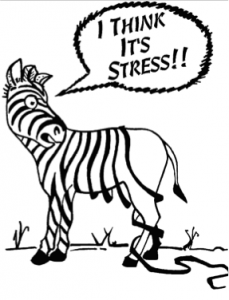Why stress can make us sick when is meant to be a physiological mechanism to protect us?
1. What is Stress?
We often say “we are stressed”: it is important to clarify the use of the term, since today, in our common language, the word stress is often used with different, contradictory meanings.
In 1976, the Austrian physician Hans Selye studied the animal physiology in survival conditions and defines stress as “the non-specific response of the body to any demand for change” and it s different from stressors that produce the response (for example,  physiological agents such as heat and cold, muscle strain, sexual activity or emotional stimuli).
physiological agents such as heat and cold, muscle strain, sexual activity or emotional stimuli).
It is appropriate to distinguish between two categories of stress on the basis of DURATION (acute stress = short-lived and the stimulus is presented only once; chronic stress = if the source of stress persists over time) or NATURE (eustress = if the situations are lived as positive and stimulating and solicit activation and commitment from the person; distress = if the situations are perceived as negative and problematic and potentially exceeding the capacity of the person) of the stressful event.
There are several definitions of stress, one of them is to consider stress as the result of an interaction between psychological, physical and behavioral features both of the individual & the environment (or the event).
2. Why do we experience Stress? Which are its causes?
Stress can not and must not be avoided. To experience stress is not a pathological condition of the body, but in some cases it can produce pathology. If the efforts of the subject fail to cope with stress, because the intense stress exceeds the individual’s ability to respond, or if exposure to the stressor is repeated and prolonged, the subject is vulnerable to mental and/or somatic illness.
3. Are there differences between individuals on the perception of stress?
Yes, there are many intervening variables between the stressor and the reaction between these:
- Individual differences, biological
 and of personality;
and of personality; - Context;
- social resources;
- Subjective Perception of the stressful event. Due to these factors a stressful event is not perceived in the same way by different people. Some might not even be perceived, while the same stressor in different life stages can be more or less stressful.
Among individual differences in the responses emotions play an important role: the psychological stress is closely related to perceived emotions, and is different from the physiological one, because the responce depends on the cognitive evaluation of the stimulus meaning.
Already since 1966 the psychologist Richard Lazarus stated that an event will be even more stressful as the individual will perceive himself/herself inadequate and unable to face it.
4. What are the factors that are typically stressful for most people?
- pleasant events such as marriage, major life changes such as moving.
- unpleasant events such as bereavement, separation, divorce, retirement, job loss, an illness, a failure, a betrayal, sudden disastrous event such as natural disasters, lack of housing, or situation such as high noise environment, high pollution levels….
- Physical factors such as intense cold or heat, the abuse of alcohol or smoking, but also serious limitations in movement.
5. What are the warning signs?
 emotional messages: anxiety, crying, agitation, tension, anger, nervousness, unhappiness, aggression, despair …
emotional messages: anxiety, crying, agitation, tension, anger, nervousness, unhappiness, aggression, despair …
cognitive disorders: distractibility, difficulty concentrating, difficulty making decisions, worry, lack of lucidity, rumination…
physical pain: sweating in particular in the hands or feet, difficulty digesting, fatigue and tiredness, headache or dizziness, muscle aches or pains in the back, tension in the neck or shoulders, tachycardia, agitation …
Effects on behavior: teeth grinding, compulsive eating or loss of appetite, use of alcohol, difficulty completing tasks, disturbances in the sexual sphere …
6. Which disorders can stress cause?
High levels of stress can cause cardiovascular, sleep, sexual, eating, and mood disorders, acute stress disorders, PTSD, or burn-out also called work-related stress.
It is known that the hypercortisolism, typical in cases of prolonged exposure to stress, is common in patients with depression.
**********************************************
Contact:
– Psychiatrist Licia Lietti +39 338 5019524
– Clinical Psychologist, Martina Trinchieri: +39 393 5564912
email: martinatrinchieri90@gmail.com
– Clinical Psychologist Martina Larsen Paya: +39 349 169627
email: martinalarsenpaya@gmail.com
http://larsen-paya-psicologa.com/
**********************************************
CONCLUSION
Remember: it doesn’t matter if stress comes from positive or negative, powerful or weak, short or long events.. What is important is actually how the person perceives it!




